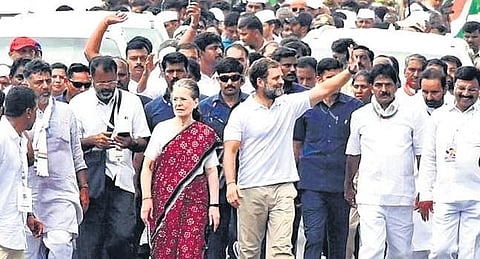

NEW DELHI: As the Congress is gearing up for its 85th Plenary session from February 24-26, the crucial question of election to the Congress Working Committee (CWC) has been the most anticipated one by political observers and alike. While many leaders point out that as the party has embarked on a democratic process with the election of a non-Gandhi at the helm after 25 years, it will have to affirm the commitment with the election of a new CWC — the apex decision-making body of the party.
Senior Congress leader and Lok Sabha MP Pradyut Bordoloi told this newspaper that the session is crucial for the party as it will allow it to identify challenges ahead of the 2024 elections. CWC elections are imperative as it will ensure the continuity of the democratic process, he said. “I hope that CWC will take place along with the plenary session.It will set a good example,” he said.
According to the Congress constitution, the CWC constitutes Congress president, its leader in Parliament, and 23 members, out of which 12 are being elected by AICC members and the rest are nominated by the president. In the past, elections to the CWC were held under PV Narasimha Rao and Sitaram Kesari in 1992 and 1997 respectively. Declining to comment on whether the CWC polls will take place or not, former defence minister and CWC member AK Antony told this newspaper that the plenary session will give a new direction in the run-up to the 2024 elections.
“The challenge before the party is to revive the idea of India. I hope that the Raipur session will steer the party to take up a major role to bring about a regime change,” said Antony. Though speculation is rife that the party may not opt for CWC polls in the election year as it may disrupt the power equations, a former party leader, who quit recently, told this paper: The leader also pointed out how in 1992, at AICC’s plenary session in Tirupati, then paty chief P V Narasimha Rao held elections to the CWC and made the elected CWC members resign and reconstituted it. "Narasimha Rao didn’t want his rivals in the CWC. He made the CWC members resign because no SC and ST members were selected,” said the leader.
Former Union Minister M Veerappa Moily, who lost the last CWC elections in 1997 at the Calcutta plenary, told this paper that it will help to prepare a clear road map for 2024 polls. However, Moily deflected the question on the CWC elections.
The party has to overcome the fear of elections, says Mridula Mukherjee, historian and former director of the Nehru Memorial Museum and Library. “When you are criticizing the current regime for weakening democracy, then I think you have to affirm your commitment to democratic principles. Any dissent or difference of opinion should be better expressed through an open process,” says Mukherjee.
Another main challenge is to put the house in order, says Bordoloi. The immediate challenge will be poll-bound Rajasthan where the tug-of-war between CM Ashok Gehlot and his former deputy Sachin Pilot poses a constant headache for the party.